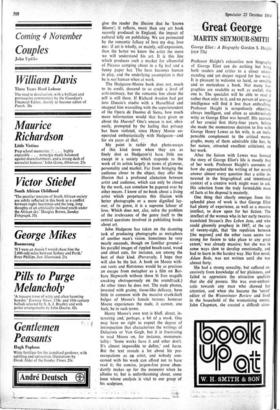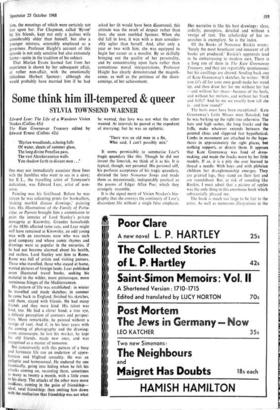Great. George
-MARTIN SEYMOUR-SMITH George Eliot : A Biography Gordon S. Haight (ot.n. 55s) Professor Haight's exhaustive new biography of George Eliot can do nothing but bring both readers and critics to a closer under- standing and yet deeper regard for her work. It is pleasant to welcome so lucid, so sensible and so meticulous a book. Not many bio- graphies are readable as well as useful; this one is. The specialist will be able to read it rather than refer to it, and no person' of average intelligence will find it less than enthralling. Professor Haight is scrupulously objective, always intelligent, and often as unobtrusively witty as George Eliot was herself. His account of her crucial first thirty-four years, before she made the momentous decision to live with George Henry Lewes 'as his wife, is an indis- pensable complement to the critical mono- graphs, many of them admirable (she has, by her nature, attracted excellent criticism), on her work.
After the liaison with Lewes was formed the story of .George Eliot's life is mostly that of her work. Professor Haight's accounts of how she approached the writing of her novels answer almost every question that a critic in- terested in the biographical and 'intentional context of a creative work might want to ask. His selection from the truly formidable mass of facts at his disposal is masterly.
One thing that clearly emerges from this splendid piece of work is that George Eliot had plenty of experience, as well -as a massive intellect, to draw upon for her fiction. The intellect of the woman who in her early twenties translated Strauss's Des Leben Jesu, and who could gloomily prophesy in 1847, at the age of twenty-eight, that `the repulsion between [the negroes] and the other races seems too strong for fusion to take place to any great extent,' was already massive; but she was in some ways slow to develop emotionally, and had to learn in the hardest way. Her first novel, Adam Bede, was not written until she was almost forty.
She had a strong sexuality, but suffered ex- cessively from knowledge of her plainness, and failed to appreciate the attractive qualities that she did possess. She was over-enthusi- astic towards any man who showed her attention, and when she became the 'secret' editor of the Westminster Review and lived in the household of the womanising owner, John Chapman, she created a difficult situa-
tion, the meanings of which were certainly not lost upon her. For Chapman, called 'Byron' by his friends, kept not only a jealous wife considerably older than himself, but also a younger mistress, ostensibly employed as a governess. Professor Haight's account of this episode is not only sensitive but also extremely funny—quite in the tradition of his subject.
That Marian Evans learned fast from her experience is shown by her subsequent affair, or rather non-affair, with the emotionally ridiculous Herbert Spencer: although she would probably have married him if he had asked her (it would have been disastrous), this attitude was the result of despair rather than love; she soon rumbled Spencer. When she did fall in love, it was with a man consider- ably uglier than herself. And, after only a year or two with him, she was equipped to begin her career as a novelist. By so skilfully bringing out the quality of her personality, and by concentrating upon facts rather than contentious moral interpretations, Professor Haight has clearly demonstrated the magnifi- cence, as well as the pettiness of the short- comings, of her achievement.















































 Previous page
Previous page